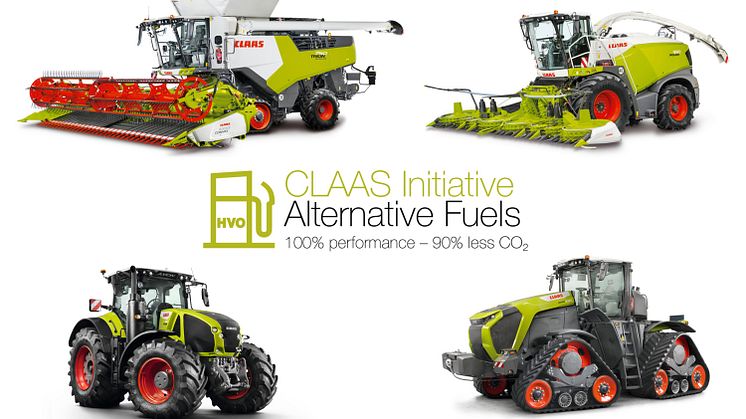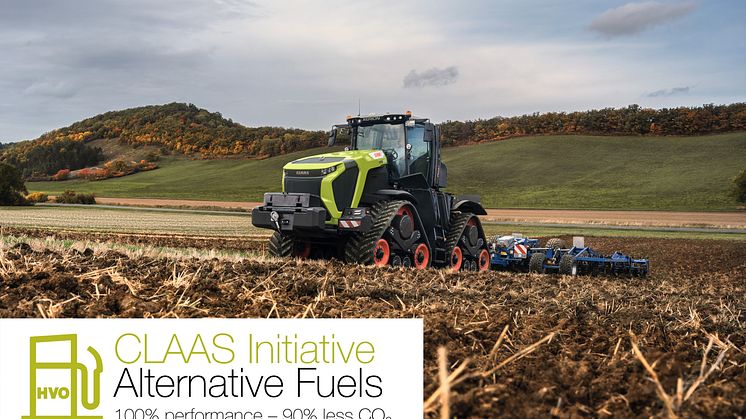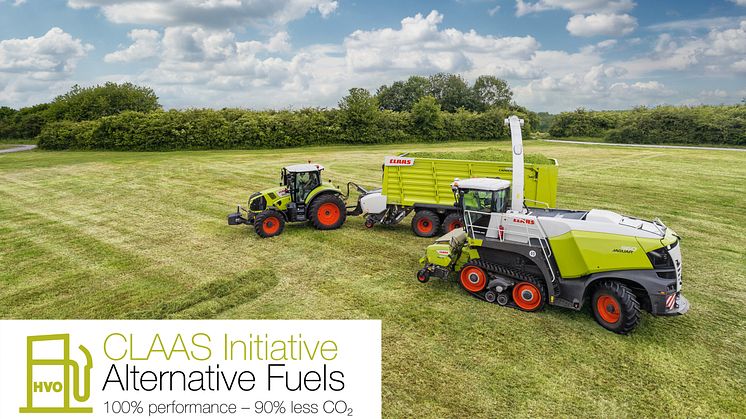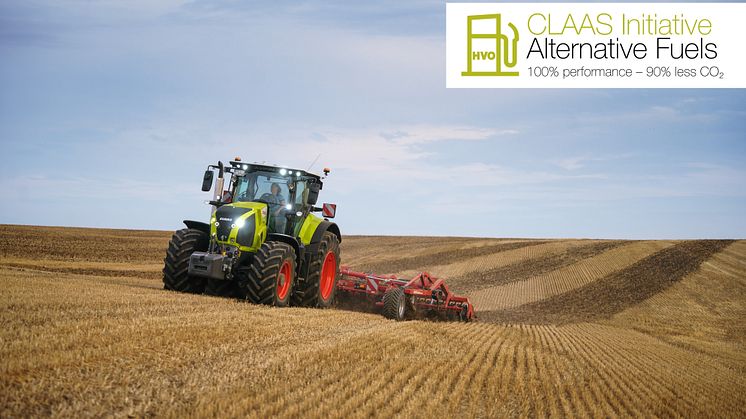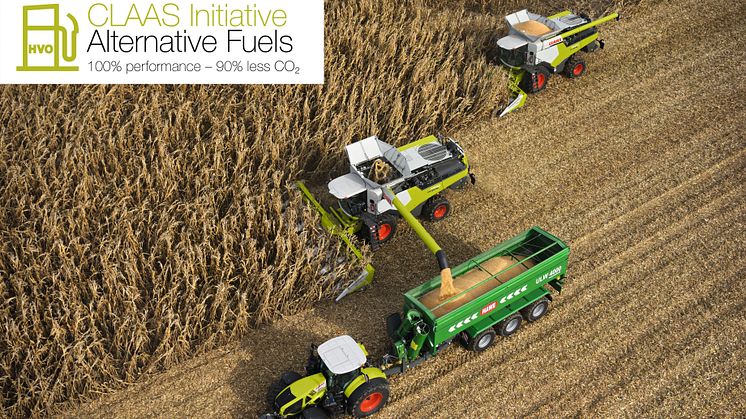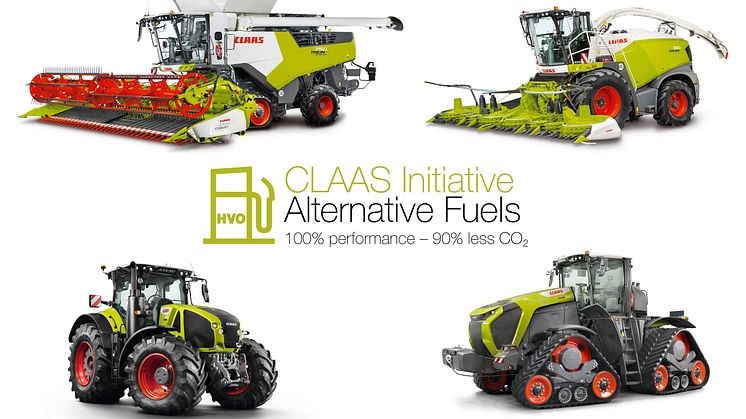
Pressemeddelelse -
HVO approval and initial factory fill for tractors, combine harvesters and forage harvesters
From 1 October 2023, all CLAAS agricultural machinery that meets the latest emissions standard will be approved for operation with hydrotreated vegetable oils (HVOs). Furthermore, the machines will be filled with the sustainable biofuel before they leave the factory gates at Harsewinkel and Le Mans.
Protecting the climate and reducing environmentally harmful CO2 emissions play an increasingly important role in agriculture. CLAAS is aware of this responsibility and is looking closely at a number of different sustainable drive technologies. The approval of hydrotreated vegetable oils (HVOs) for all agricultural machines that meet the latest emissions standard (Stage V) marks a significant step in this direction. This means that the machines will be able to run on this sustainable liquid biofuel in future. Dr Martin von Hoyningen-Huene, Executive Vice President BU Tractor: "There are no real alternatives to the combustion engine for high-performance agricultural machines in the foreseeable future. So we need solutions that reduce fossil fuel emissions associated with this type of drive, yet do not have significant adverse effects on manufacturing costs, consumption, weight and durability. Hydrotreated plant oils are an ideal choice because they already exist and their positive environmental impacts are immediately apparent."
Sustainable argument in favour of the combustion engine
In agriculture, diesel fuels are the main energy source for mobile farm machines. At the same time, climate targets require us to find alternatives to fossil fuels. A gradual de-fossilisation of agricultural production processes and agricultural machinery is needed in several respects, and this will shape the development of future drive systems. However, this will only be feasible in practice with the backing of appropriate supporting policies.
While battery-powered drive offers advantages for low engine outputs, this technology reaches its limits with increasing power and energy requirements. A JAGUAR forage harvester with a battery-powered drive would have to be at least twice the size and twice the weight of a current model with combustion engine and liquid fuel to achieve a comparable performance and range. Gaseous fuels such as methane or hydrogen also have significant disadvantages in terms of their energy density and thus their energy storage requirements. “For some time now, CLAAS has adopted an open-minded approach to technology, on the grounds that a comprehensive de-fossilisation of the agricultural sector calls for the availability and cost effectiveness of a wide range of solutions to be examined", explains Patrick Ahlbrand, CLAAS Product Strategy. "In future, battery-powered drives will offer a suitable alternative for municipal work, light fieldwork and applications in and around the farmyard. However, for harvesting machines and large tractors above 150 hp, there is no realistic alternative to sustainable liquid fuels in the long-term."
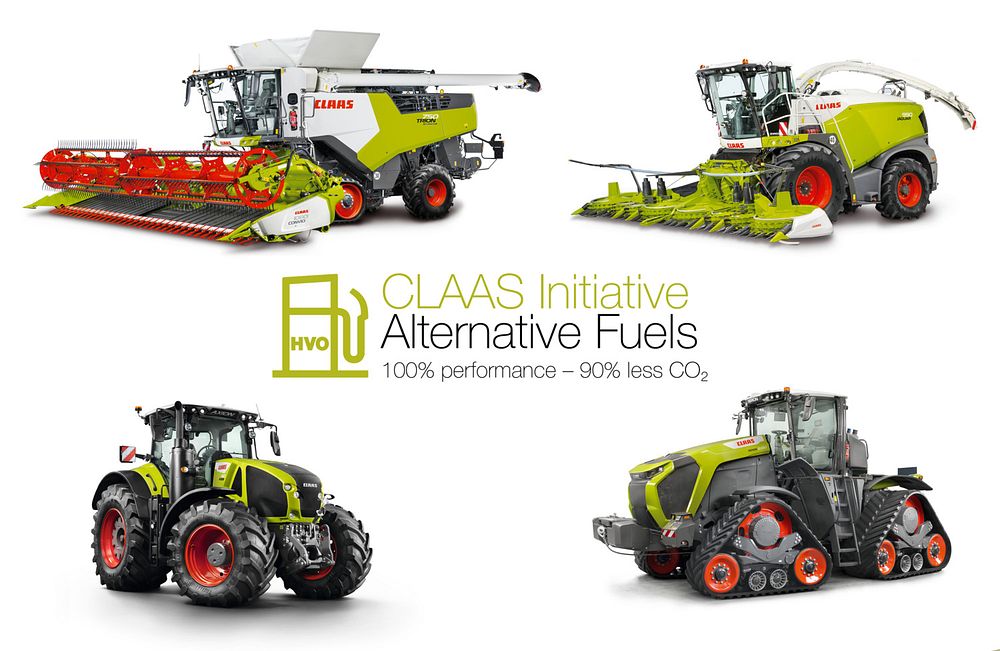
From 1 October 2023, all CLAAS agricultural machinery that meets the latest Stage V emissions standard will be approved for operation with hydrotreated vegetable oils (HVOs). Furthermore, the machines will be filled with the sustainable biofuel before they leave the factory gates at Harsewinkel and Le Mans.
- CLAAS standard tractors from Le Mans (Stage V)
- CLAAS XERION system and large tractors from Harsewinkel (Stage V)
- CLAAS TRION and LEXION combine harvesters from Harsewinkel (Stage V)
- CLAAS JAGUAR forage harvesters from Harsewinkel (Stage V)
Initial fill at the factory: 2,500 tonnes of CO2 savings a year
From 1 October 2023, CLAAS tractors and harvesting machines from Harsewinkel and Le Mans that meet the latest Stage V emissions standard will be approved for use with HVO (hydrotreated vegetable oil). Furthermore, before they leave the factory, all machines will be filled with this fuel, which is up to 90% climate-neutral. This measure will save 2500 tonnes of CO2 a year, enabling both factories to make an active contribution to combating climate change right now.
Fully miscible and immediately available – without technical modifications or additional costs
The use of HVO offers several advantages compared with other technologies and fuels. There is no need to upgrade or replace Stage V machines. They can simply be filled with HVO and then used exactly as before, even with diesel, without any restrictions. At the same time, existing farm fuel tanks can still be used without requiring modification, which farmers and contractors are particularly pleased about. With fuel characteristics comparable with those of fossil fuels, there are no noticeable losses in terms of performance, operating lifetime, wear or durability. HVO can be used in its pure form (HVO100) or as a drop-in fuel mixed in any ratio with conventional diesel. When using HVO100, CO2 emissions can be reduced by up to 90% over the entire life cycle compared with fossil diesel. At the same time, less nitrogen oxide and particulate matter are emitted during combustion. Furthermore, since the fuel is manufactured mainly from waste and residues, no additional vegetable oils have to be produced, which minimises competition with food.
Widely available already
HVO consists mainly of waste and residues, including used cooking oil and animal fats, along with vegetable oils. In downstream production processes, the biogenic raw materials are converted to hydrocarbons in a reaction with a small quantity of hydrogen (hydrogenation). This process modifies the characteristics of the vegetable oils to resemble fossil fuels, enabling them to be used as a diesel substitute in mobile work machines.
In many countries the fuel is already widely available at fuel stations, either in the form of pure HVO100 or blended with conventional diesel fuel. In contrast, in some countries HVO100 can only be sold through closed user groups such as company filling stations. However, international efforts indicate that HVO100 will soon be available trans-nationally under the DIN EN 15940 fuel standard (Paraffinic diesel fuel from synthesis or hydrotreatment)
Emner
Kategorier
About CLAAS
CLAAS (www.claas-group.com) is a family business founded in 1913 and is one of the world’s leading manufacturers of agricultural machinery. The company, with Head Office in Harsewinkel, Westphalia, is the European market leader for forage harvesters. CLAAS dominates the European market in another core segment as well – combine harvesters. CLAAS also holds the top spots in global agricultural technology with its tractors as well as its agricultural balers and grassland harvesting machines. Cutting-edge agricultural information technology also forms part of its product range. CLAAS employs more than 12,000 staff worldwide and generated a turnover of 4.9 billion euros in 2021.


